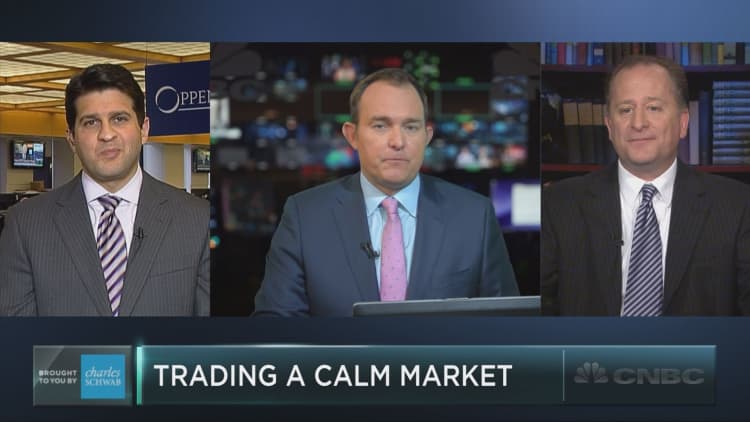
Fear? What fear? That's the attitude exhibited by investors right now, according to strategists at Academy Securities. In fact, the biggest worry on Wall Street right now might be that no one is worried, they said.
In a note to clients Sunday, they point out that the CBOE Volatility Index (Vix) — which is widely used to gauge fear in the market — closed at 9.14 on Friday, its lowest level since calculations on the index began in 1990. It traded up 3 percent at 9.42 on Monday.
"This is just a good old-fashioned VIX beatdown because there is little left to scare markets," said Peter Tchir, head of macro strategy at Academy Securities, in the note titled "Nothing to Fear but Lack of Fear Itself."
Stocks have levitated to record highs this year, as investors continuously shrug off policy and geopolitical risks. So what's driving Wall Street's fearless attitude? Tchir points out several factors, including earnings and tax reform.
This earnings season has been a stellar one. According to FactSet, S&P 500 third-quarter earnings have grown 6.2 percent.
"Earnings, at least of the companies that matter most to market valuations and sentiment, have been good," said Tchir. "Earnings in the market-driving companies have been strong enough, and in the cases where there was disappointment, hope for future products overcame that concern."
This season follows two previously astounding ones. In the first and second quarter of the year, S&P 500 earnings grew 15.5 percent and 10.8 percent, respectively.
On the tax-reform front, the House released last week a bill aimed at overhauling the U.S. tax code. Among the biggest changes would be permanently lowering the corporate tax rate to 20 percent from 35 percent.
"The bill itself seemed to deliver on a lot of what was promised, especially for corporations — which should be good for markets," Tchir said.
Other factors mentioned by Tchir were seasonality (stocks have historically performed well this time of the year) and seemingly diminished geopolitical risks out of North Korea (at least in the market's eyes).
What could go wrong?
Still, Tchir notes there are a few factors that could derail the market from its quiet rise to record highs.
The first is exhaustion. This bull market may be exhibiting signs of exhaustion as the small-caps Russell 2000 fell 0.9 percent last week, Tchir said. In turn, the Dow Jones industrial average, S&P 500 and Nasdaq composite notched weekly gains.
He also said that high-yield bonds also fell last week. They were "small declines, but declines nonetheless. The high yield bond market has experienced some idiosyncratic risk – highlighting that company-specific risk is real," Tchir said.
Another potentially detrimental factor for the market could be special counsel Robert Mueller's investigation into Russian attempts to interfere in the 2016 election. "While we have had a reprieve since the arrests were announced last week, I find it hard to believe that we have heard the last from him, and that risk is not being priced in," said Tchir.






